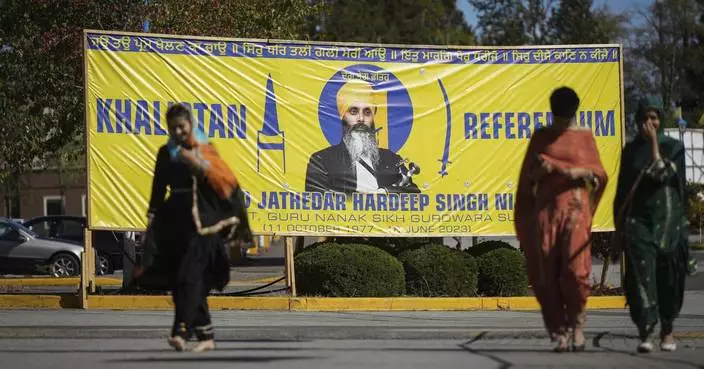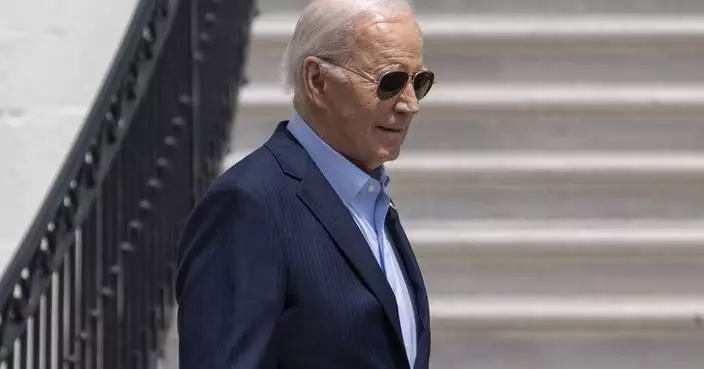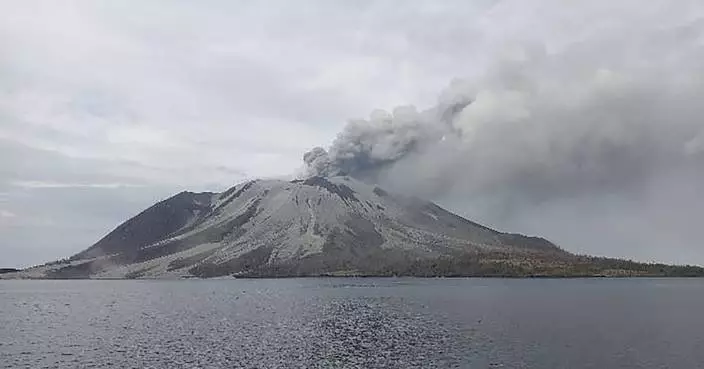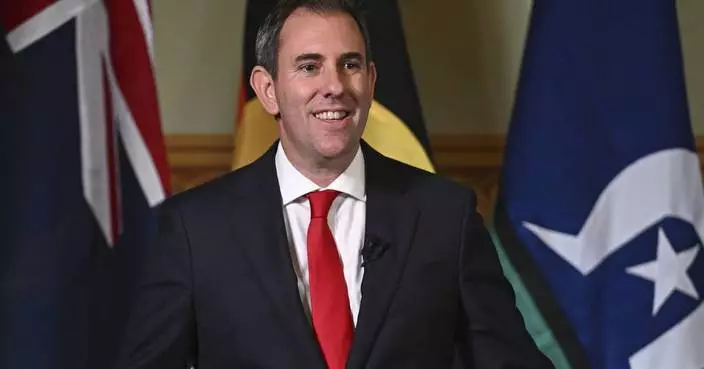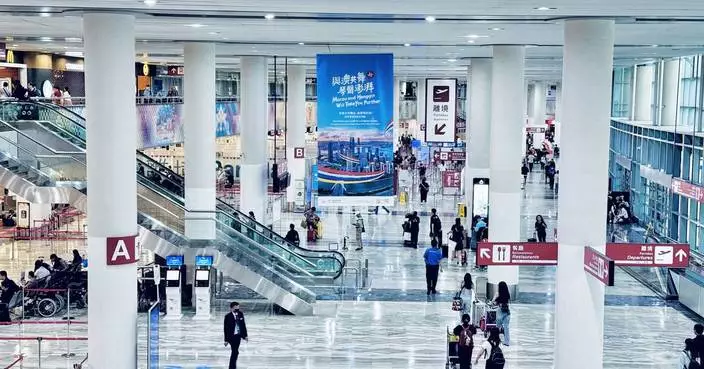At least four rebels, a counterinsurgency police official and a civilian were killed during a gunbattle in disputed Kashmir on Friday, triggering anti-India protests and clashes in which several people were injured.
Government forces raided a cluster of homes on a tip that rebels were hiding in the southern Srigufwara area and they came under fire from militants, police said.

A masked Kashmiri protester watches from a distance as Indian policemen fire tear gas shells towards him during a protest in Srinagar, Indian controlled Kashmir, Thursday, June 21, 2018. (AP Photo/Dar Yasin)
Four militants and a police official with the counterinsurgency force were killed in the fighting, said Col. Rajesh Kalia, an Indian army spokesman.
Police said a civilian husband and wife were hit by gunfire as soldiers cornered the rebels in the couple's house. Residents said the couple was not given time by government forces to leave their home. They were evacuated to a hospital where the husband was declared dead on arrival.
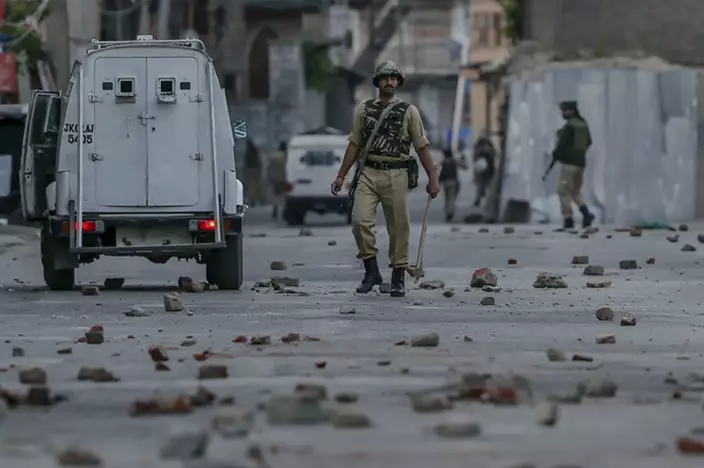
Indian paramilitary soldiers walk on a road dotted with bricks and stones thrown at them during a protest in Srinagar, Indian controlled Kashmir, Thursday, June 21, 2018. (AP Photo/Dar Yasin)
Police said at least two soldiers were also wounded in the fighting.
As the fighting raged, protests and clashes broke out nearby and in other neighborhoods as residents tried to help the trapped militants escape.
Government forces fired shotgun pellets and tear gas at the stone-throwing protesters, injuring at least 20.
Authorities suspended cellphone internet service in several districts in the region, a common practice to make organizing protests more difficult, and according to the government, stop the spread of rumors.
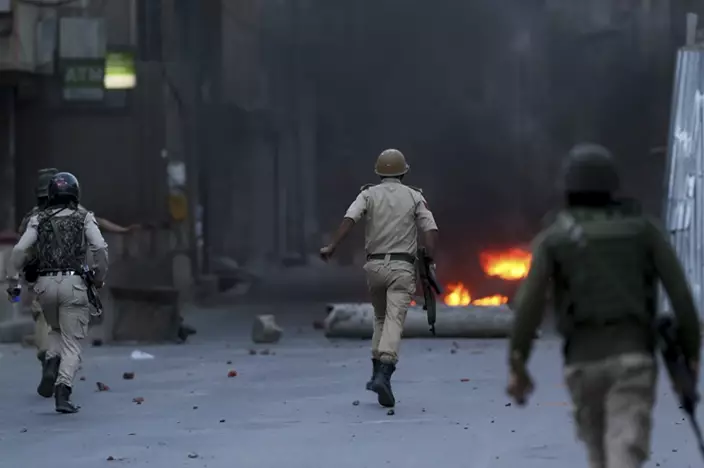
Indian policemen chase Kashmiri protesters during a protest in Srinagar, Indian controlled Kashmir, Thursday, June 21, 2018. (AP Photo/Dar Yasin)
Large anti-India protests and clashes later erupted on the outskirts of Srinagar, Kashmir's main city, as thousands gathered to participate in the funeral of one of the slain militants who was from the area.
Protesters, chanting pro-rebel slogans and demanding the end of Indian rule in Kashmir, blocked a major highway and fought pitched battles with government forces. Several people were reportedly injured in the clashes.
Also on Friday, at least nine police and paramilitary soldiers were injured when rebels attacked their patrol with a grenade and gunfire in southern Tral town, police said.
India and Pakistan have fought two wars over Kashmir, which is divided between the neighbors but claimed by both in its entirety. Since 1989, rebel groups have been fighting against Indian rule, and about 70,000 people have been killed in the armed uprising and a subsequent Indian military crackdown. Rebels demand that Kashmir be united either under Pakistani rule or as an independent country.
India accuses Pakistan of arming and training the rebels, a charge Pakistan denies.
TOKYO (AP) — Japan and India on Saturday decried remarks by U.S. President Joe Biden describing them as “xenophobic” countries that do not welcome immigrants, which the president said during a campaign fundraising event earlier in the week.
Japan said Biden's judgment was not based on an accurate understanding of its policy, while India rebutted the comment, defending itself as the world’s most open society.
Biden grouped Japan and India as “xenophobic” countries, along with Russia and China as he tried to explain their struggling economies, contrasting the four with the strength of the U.S. as a nation of immigrants.
Japan is a key U.S. ally, and both Japan and India are part of the Quad, a U.S.-led informal partnership that also includes Australia in countering increasingly assertive China in the Indo-Pacific.
Just weeks ago, Biden hosted Japanese Prime Minister Fumio Kishida on an official visit, as the two leaders restated their “unbreakable alliance” and agreed to reinforce their security ties in the face of China’s threat in the Indo-Pacific.
Indian Prime Minister Narenda Modi also made a state visit to Washington last year, when he was welcomed by business and political leaders.
The White House said Biden meant no offense and was merely stressing that the U.S. was a nation of immigrants, saying he had no intention of undermining the relationship with Japan.
Japan is aware of Biden's remark as well as the subsequent clarification, a Japanese government official said Saturday, declining to be named due to the sensitivity of the issue.
The official said it was unfortunate that part of Biden's speech was not based on an accurate understanding of Japanese policies, and that Japan understands that Biden made the remark to emphasize the presence of immigrants as America’s strength.
Japan-U.S. relations are “stronger than ever” as Prime Minister Kishida showed during his visit to the U.S. in April, the official said.
In New Delhi, India’s External Affairs Minister S. Jaishankar on Saturday also rebutted Biden’s comment, saying India was the most open society in the world.
``I haven’t seen such an open, pluralistic, and diverse society anywhere in the world. We are actually not just not xenophobic, we are the most open, most pluralistic and in many ways the most understanding society in the world,” Jaishankar said at a roundtable organized by the Economic Times newspaper.
Jaishankar also noted that India’s annual GDP growth is 7% and said, “You check some other countries’ growth rate, you will find an answer.” The U.S. economy grew by 2.5% in 2023, according to government figures.
At a hotel fundraiser Wednesday, where the donor audience was largely Asian American, Biden said the upcoming U.S. election was about “freedom, America and democracy” and that the nation’s economy was thriving “because of you and many others.”
“Why? Because we welcome immigrants,” Biden said. “Look, think about it. Why is China stalling so badly economically? Why is Japan having trouble? Why is Russia? Why is India? Because they’re xenophobic. They don’t want immigrants.”
Japan has been known for a strict stance on immigration. But in recent years, it has eased its policies to make it easier for foreign workers to come and stay in Japan as a way to mitigate its declining births and rapidly shrinking population. The number of babies born in Japan last year fell to a record low since Japan started compiling the statistics in 1899.
India, which has the world’s largest population, enacted a new citizenship law earlier this year by setting religious criteria that allows fast-tracking naturalization for Hindus, Parsis, Sikhs, Buddhists, Jains and Christians who fled to India from Afghanistan, Bangladesh and Pakistan, while excluding Muslims.
AP writers Ashok Sharma in New Delhi and Seung Min Kim in Washington contributed to this report.
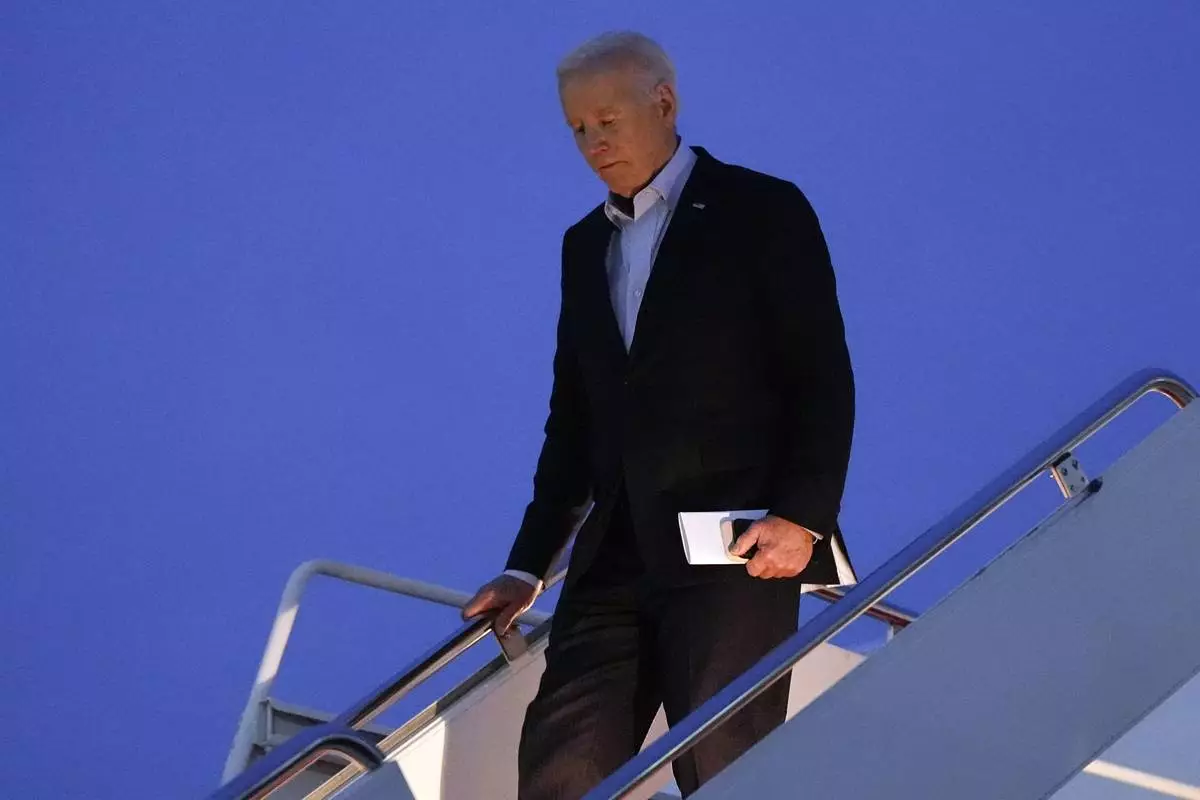
FILE - President Joe Biden arrives on Air Force One at Andrews Air Force Base, Md., Tuesday, April 30, 2024.. (AP Photo/Evan Vucci, File)







